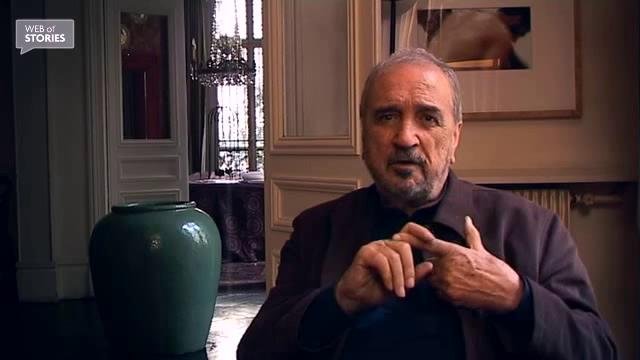NEXT STORY

Algeria’s past
RELATED STORIES

NEXT STORY

Algeria’s past
RELATED STORIES


|
Views | Duration | |
|---|---|---|---|
| 11. Each country writes history its own way | 2 | 132 | 02:31 |
| 12. Military experience in Algeria | 121 | 01:40 | |
| 13. Algeria’s past | 101 | 01:52 | |
| 14. 'It Was War' | 99 | 01:33 | |
| 15. Working as the colonel’s secretary | 89 | 01:14 | |
| 16. My life inclined towards films | 116 | 03:33 | |
| 17. Jacques Tati picked me | 1 | 177 | 03:39 |
| 18. Observations in the rain | 1 | 152 | 01:06 |
| 19. What I learned from Tati | 2 | 169 | 01:24 |
| 20. Quest for the ideal sound effect | 137 | 02:05 |


Mon expérience militaire a été tardive car comme j’étais normalien, un élève de normal sup, j’avais droit, à ce qu’on appelle, un sursis, c’est-à-dire de partir plus tard. Quand je suis parti au service militaire, alors que j’avais 27 ans et déjà une certaine expérience de la vie. J’avais publié des livres déjà. J’étais élève de l’école normale supérieure et donc je suis parti au moment de la guerre d’Algérie. Comme j’étais marié j’ai fait une partie de service en France et un peu plus d’un an en Algérie. C’est une expérience qui sur le moment, quand on se lance dans la vie de 27 à 30 ans, paraît une période de vide complet. De temps absolument perdu: «Que-ce que je fais ici, je ferai mieux de travailler de me lancer dans la vie, quoi que ce soit que je veuille faire de ma vie». Et puis les années passant on se rend compte que ces 29 mois, en ce qui me concerne, de service militaire, ont été une période de préparation. Et presque d’entraînement à ce qui allait suivre. D’abord tout ce que je pouvais avoir d’illusion restante sur le rôle de la France dans ses colonies et en particulier en Algérie s’est effondré car qu’on se trouvait là bas on se rendait bien compte de toute évidence que nous n’étions pas chez nous, la première des choses, que notre présence n’y était pas souhaitée, qu’elle n’avait pas été si profitable que ça aux algériens et ainsi de suite. Que nous avions qu’à nous en aller, c’était évident. En même temps, l’historien que j’étais déjà s’intéressait beaucoup à l’histoire de l’Algérie.
My military experience was late as I was normalien, I had gone to Normale Superieure, I was entitled to an extension, meaning leaving later. So when I left, I was 27 and had gained some life experience already. I had published books. I was a student of Normale Superieure, and so I left when the Algerian War was taking place. As I was married I did part of it in France, and did a bit more than a year in Algeria. It was the type of experience, when you are 27 or 30 years old, which seems to be meaningless. A complete waste of time, 'What am I doing here, I should be working, starting my life - whatever I want to do with it'. And as the years go by, you realise that those 29 months, at least from my point of view, that military conscription, were like some sort of time of preparation. Some training for what was still to come. First, any illusion left about the part France played in the colonies and particularly in Algeria, disappeared, since when we were there we could only realise that we weren't home, mainly because we weren't even welcome, and the French presence had not brought much to Algerians, and so on. It was obvious that all that was left to do was to go away. At the same time, the historian in me was already interested in the history of Algeria.
French screenwriter Jean-Claude Carrière (1931-2021) began his association with films aged 24 when he was selected by Jacques Tati to write for him. This early experience led to further contact with other film-makers, including Luis Buñuel with whom Carrière collaborated for many years. He wrote screenplays for films including Belle de Jour, The Discreet Charms of the Bourgeoisie, Tin Drum and Danton.
Title: Military experience in Algeria
Listeners: Andrzej Wolski
Film director and documentary maker, Andrzej Wolski has made around 40 films since 1982 for French television, the BBC, TVP and other TV networks. He specializes in portraits and in historical films. Films that he has directed or written the screenplay for include Kultura, which he co-directed with Agnieszka Holland, and KOR which presents the history of the Worker’s Defence Committee as told by its members. Andrzej Wolski has received many awards for his work, including the UNESCO Grand Prix at the Festival du Film d’Art.
Tags: Algeria, France, Algerian War
Duration: 1 minute, 40 seconds
Date story recorded: January 2010
Date story went live: 26 July 2010